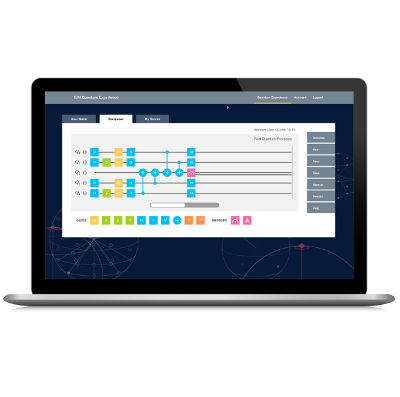| IBM Might Give Some Access To Its Five-Qubit Quantum Computer |
| Written by Mike James |
| Thursday, 05 May 2016 |
|
Our headline is reasonably accurate - what do you expect in a single sentence - but others are less so. IBM has provided access to some quantum computing hardware and this is interesting, but it isn't a revolution. Despite my initial misgivings about who would be allowed to use the quantum computer IBM did allow me access without special pleading and just on the basis of saying that my institution was I Programmer, my knowledge of quantum physics was based on an undergrad course (I lied I also did a postgrad course on quantum computing) and that all I wanted to do was try it out for educational reasons. So it could be that the bar to getting to use the system is lower than expected. Once you get into the site you can't use the quantum computer at once. You have to work your way though a set of examples earning units until you have 10 whole units to spend on the real machine. You also get another 15 units as a "free gift".
Some news outlets are saying things like "IBM beats Google to quantum computing" and "Now anyone can quantum compute". These are a bit wide of the mark. IBM is doing some interesting work in quantum computing, but putting a 5-qubit machine online and allowing some people to use it isn't really a clear cut beating of Google's research team, or any other. What IBM has done is to build a website that has a lot of interesting resources, videos and tutorials on how quantum computing works. You can also sign up to be allowed to use a 5-qubit version of the machine online, or "in the cloud" as we generally say these days. This is nice but it isn't exactly general access. You have to sign up; provide an institution to which you are affiliated; state how much you know about quantum mechanics, and quantum computing in particular; and finally state what you plan to do with the machine. After this, IBM will get back to you and give you some credits that you can use to run programs on the machine. If you want to see what sort of interface the machine has, and how you might go about programming it, see the following video: The machine in question in a linear array of five qubits. To give you some idea of how powerful this is IBM managed to factor the number 15 into 3 x 5 using a 7-qubit machine. IBM is also working on rectangular arrays of qubits that implement the sort of error correction needed to make quantum computing practical. Currently it is estimated that we need at lest a 50-qubit machine to exceed the power of our current super computers. IBM is confident that it can reach this point in the next few years and claims that the web site and the access to the small machine is a good way to get programmers ready for this. As to being in competition with Google, it is worth explaining that Google is taking a very different approach to quantum computing. Its D-Wave computer makes use of quantum annealing to solve optimization or constraint problems. This is a much simpler engineering task, but even in this case it isn't clear that it really is doing something a classical computer couldn't do. Even so Google just announced that using a minimization algorithm it factored 56,153 which is way bigger than 15, but still not impressive from a classical point of view and still not provably quantum computing.
Dwave's quantum chip
What exactly programmers are going to do with a chance to program a 5-qubit machine is a very good question. The promise that a quantum computer might be able to factorize really big numbers in really quick times is the main motivating force behind general purpose quantum computing. Such a thing would make the cracking of uncrackable codes very easy and this is of global importance. After factorization most of the quantum algorithms are for important, but niche, calculations - mainly optimization and constraint satisfaction problems. Having a real, but small machine, to use doesn't seem to add much to the situation. You can get most of the results you need from simulations of quantum computers. A real quantum computer just adds to the feeling that you are doing something that one day might be useful.
More InformationQuantum factorization of 56153 with only 4 qubits Related ArticlesQuantum Mechanics: The Theoretical Minimum Quantum Physics Is Undecidable Microsoft Releases Quantum Computing Tool QScript A Quantum Computer In Your Browser Riecoin Crypto Currency Mines Primes For Riemann Public Key Cryptography Set To Fail In Five Years Solve The Riemann Hypothesis With A Quantum Computer Boson Sampling Tests Quantum Computing A Quantum Computer Finds Factors
To be informed about new articles on I Programmer, sign up for our weekly newsletter, subscribe to the RSS feed and follow us on, Twitter, Facebook, Google+ or Linkedin.
Comments
or email your comment to: comments@i-programmer.info |
| Last Updated ( Thursday, 05 May 2016 ) |




